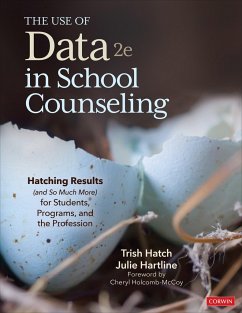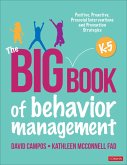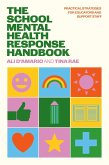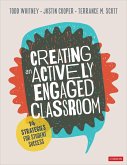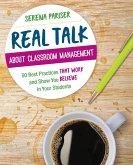Trish Hatch, Julie Hartline
The Use of Data in School Counseling
Hatching Results (and So Much More) for Students, Programs, and the Profession
Schade – dieser Artikel ist leider ausverkauft. Sobald wir wissen, ob und wann der Artikel wieder verfügbar ist, informieren wir Sie an dieser Stelle.
Trish Hatch, Julie Hartline
The Use of Data in School Counseling
Hatching Results (and So Much More) for Students, Programs, and the Profession
- Broschiertes Buch
- Merkliste
- Auf die Merkliste
- Bewerten Bewerten
- Teilen
- Produkt teilen
- Produkterinnerung
- Produkterinnerung
Turn random acts of school counseling into definitive and data-driven efforts! In this new edition of a bestseller, school counseling scholar and advocate Trish Hatch and National School Counselor of the Year Julie Hartline provide school counselors with new ways for moving from reactive to proactive and from random to intentional counseling. By using data to determine what all students deserve to receive and when some students need more, readers will learn effective ways to provide proactive school counseling services, hold themselves accountable, and advocate for systemic change. Inside…mehr
Andere Kunden interessierten sich auch für
![The School of Hope The School of Hope]() Cathleen BeachboardThe School of Hope31,99 €
Cathleen BeachboardThe School of Hope31,99 €![The Big Book of Behavior Management, K-5 The Big Book of Behavior Management, K-5]() David CamposThe Big Book of Behavior Management, K-532,99 €
David CamposThe Big Book of Behavior Management, K-532,99 €![The School Mental Health Response Handbook The School Mental Health Response Handbook]() Tina RaeThe School Mental Health Response Handbook27,99 €
Tina RaeThe School Mental Health Response Handbook27,99 €![Creating an Actively Engaged Classroom Creating an Actively Engaged Classroom]() Todd WhitneyCreating an Actively Engaged Classroom41,99 €
Todd WhitneyCreating an Actively Engaged Classroom41,99 €![Students Who Drive You Crazy Students Who Drive You Crazy]() Kottler, Jeffrey A., Ph.D.Students Who Drive You Crazy29,99 €
Kottler, Jeffrey A., Ph.D.Students Who Drive You Crazy29,99 €![Real Talk About Classroom Management Real Talk About Classroom Management]() Serena PariserReal Talk About Classroom Management29,99 €
Serena PariserReal Talk About Classroom Management29,99 €![Real Talk About Classroom Management Real Talk About Classroom Management]() Serena PariserReal Talk About Classroom Management30,99 €
Serena PariserReal Talk About Classroom Management30,99 €-
-
Turn random acts of school counseling into definitive and data-driven efforts! In this new edition of a bestseller, school counseling scholar and advocate Trish Hatch and National School Counselor of the Year Julie Hartline provide school counselors with new ways for moving from reactive to proactive and from random to intentional counseling. By using data to determine what all students deserve to receive and when some students need more, readers will learn effective ways to provide proactive school counseling services, hold themselves accountable, and advocate for systemic change. Inside you'll find: * Clear and straightforward directions for analyzing data, planning and providing interventions, and evaluation * Strategies for using data to drive interventions, develop curriculum scope and sequence, create action plans and pre- and post-tests, initiate systems changes, and report results * Methods aligned with the most recent edition of the ASCA National Model (2019), ASCA Professional Standards and Competencies, Evidence-Based Practice, Multi-Tiered Systems of Support (MTSS), and Multi-Tiered Multi-Domain Systems of Support (MTMDSS) * New practitioner examples and artifacts, including a RAMP School of Distinction Flashlight Package, plus dozens of tools, templates, surveys, action plans, and data management forms Equip yourself to think and plan differently, and become more efficient and effective by using data to drive your school counseling program!
Produktdetails
- Produktdetails
- Verlag: SAGE Publications Inc
- 2 Revised edition
- Seitenzahl: 472
- Erscheinungstermin: 15. Oktober 2021
- Englisch
- Abmessung: 217mm x 278mm x 30mm
- Gewicht: 1190g
- ISBN-13: 9781071825600
- ISBN-10: 1071825607
- Artikelnr.: 61475935
- Herstellerkennzeichnung
- Libri GmbH
- Europaallee 1
- 36244 Bad Hersfeld
- gpsr@libri.de
- Verlag: SAGE Publications Inc
- 2 Revised edition
- Seitenzahl: 472
- Erscheinungstermin: 15. Oktober 2021
- Englisch
- Abmessung: 217mm x 278mm x 30mm
- Gewicht: 1190g
- ISBN-13: 9781071825600
- ISBN-10: 1071825607
- Artikelnr.: 61475935
- Herstellerkennzeichnung
- Libri GmbH
- Europaallee 1
- 36244 Bad Hersfeld
- gpsr@libri.de
Trish Hatch, Ph.D., retired as a professor at San Diego State University (SDSU) in August of 2019 and was recently awarded Professor Emeritus status. During her tenure, Dr. Hatch served as Director of the School Counseling Program from 2004-2015 and as Executive Director of SDSU's Center for Excellence in School Counseling and Leadership. She is the best-selling author of The Use of Data in School Counseling (2013) and co-author of Evidence-Based School Counseling: Making a Difference with Data-Driven Practices (Dimmitt, Carey, and Hatch, 2007) and the ASCA National Model: A Framework for School Counseling Programs (ASCA, 2003, 2005). These books, as well as the three most recent collaborative texts that focus on implementing elementary and secondary school counseling programs, are used throughout the world in the preparation and professional development of school counselors. Trish recently self-published Pilots, Passengers, Prisoners and Hijackers: An Educator's Guide to Handling Difficult People While Moving Forward (2018), a book derived from nearly 20 years of workshops and keynote speeches she'd given on the topic. Regarded within the profession as an advocate and national leader, Dr. Hatch served as a consultant and advisor on school counseling and educational issues for the White House and the U.S. Department of Education under the Obama administration. In 2014, she co-led the organization and planning of the second "invitation-only" White House Convening on School Counseling at SDSU. A former school counselor, site and central office administrator, state association president, and American School Counselor Association (ASCA) Vice President, Dr. Hatch has received multiple national awards, including ASCA's Administrator of the Year award and its highest honor, the Mary Gehrke Lifetime Achievement award. She most recently received the National Association for College Admission Counseling's (NACAC) Excellence in Education Award, previously awarded to First Lady Michelle Obama and Senator Tom Harkin, as well as the inaugural California Association of School Counselors' School Counselor Educator of the Year award. As President and CEO of Hatching Results, LLC, Dr. Hatch leads a team of award-winning school counseling professionals who provide training and consultation to school districts across the country.
Foreword
Acknowledgments
About the Authors
Learning Targets
Introduction
Chapter 1. Implementing School Counseling Programs for All Students
Standards-Based Education
School Counseling Standards
The ASCA National Model
An Introduction to Multi-Tiered System of Supports (MTSS)
An Introduction to Multi-Tiered, Multi-Domain System of Supports (MTMDSS)
Tier 1 of MTMDSS for School Counselors
Chapter 2. Intentional School Counseling for Students Who Need More
What Is Intentional School Counseling?
Intentional School Counseling and the ASCA National Model
Intentional School Counseling (Tiers 2 & 3) Within MTMDSS
Intentional School Counseling and Evidence-Based Practices
Dropout Prevention and Intentional School Counseling
Chapter 3. The Use of Data to Drive Interventions
School Counselor Data Proficiency
Types of Data
Disaggregation of Data
Setting Reasonable, Measurable Outcome Goals
Federal Grants Call for Even More Data-Driven Decision Making
Chapter 4. Program Evaluation: Using Data to Evaluate Interventions
Process (Participation) Data: What You Did for Whom
Perception (Mindsets and Behaviors) Data: Did You ASK?
Outcome Data: So What?
Hatching Results Conceptual Diagrams
Changes in Data Over Time
Disaggregating Data
Chapter 5. Action Plans: A Two-Pronged Approach
School Counseling Curriculum: Every Student Gets Every Thing
Guidelines for Using Tier 1 School Counseling Curriculum Action Plans
Sample Tier 1 School Counseling Curriculum Action Plans
Intentional School Counseling: Some Kids Need More
Guidelines for Using Intentional Tier 2 School Counseling Action Plans
Sample Intentional Tier 2 School Counseling Action Plans
Chapter 6. Determining School Counseling Curriculum and Interventions
The Art and Science of School Counseling
Research on Non-Cognitive Factors Impacting Achievement
Evidence-Based Approaches
Data-Driven School Counseling Curriculum Decisions
Family Programs and Activities to Support Curriculum
Data-Driven Intentional School Counseling Intervention Decisions
Using Surveys and Finding the Root Cause
Providing Interventions and Curriculum
Chapter 7. Creating Pre-/Posttests
Why Assess? "We Are Teachers, Too"
A-S-K (ASK Them What They Learned)
Attitude: How Is an Attitude Question Created?
Knowledge: How Is a Knowledge Question Created?
Skills: How Is a Skills Question Created?
Beginning Ideas for Pre-/Posttests
Common Questions About Pre-/Posttests
Hints for Creating and Administering Pre-/Posttests
Analyzing and Improving Pre-/Posttests
Final Thoughts on Pre-/Posttests
Chapter 8. Intentional School Counseling for Systems Change
Defining Terminologies and the Work of Systemic Change
School Counselors as Social Justice Advocates
Conducting Data Conversations
Advocating for Systems Change
Intentional School Counseling Action Plans for Systems Change
Activity: Scenarios to Discuss
Chapter 9. Finding (Making) Time: Setting Priorities
Time and Choices
The Annual Administrative Conference
Student Appointment Requests
Calendars
Administrator Check-In Tool
School Counselor Meetings and Sacred Collegial Talk Time
Ratios and Time
Staying in Our Lane: Effective Collaboration With Other Student Services
Personnel
FAQs and Time Suckers
School Counseling Program Organizational Questionnaire
Creating a School Counseling Program Handbook
Final Thoughts-Nice Counselor Syndrome
Chapter 10. Reporting Results
Program Evaluation Versus Research
Why Results Reports?
Filling Out the Results Report
Impact Over Time
Calculating Percentages
Creating Graphic Representations of Data
A Common Mistake/Pitfall
Chapter 11. Reporting Results via the Flashlight Approach
The Flashlight Approach: Measuring One Thing-Well
Flashlight Slide Deck Template and a Detailed Walk-Through of a
Presentation
Other Optional Flashlight Presentation Slides
Flashlight Rating Scale Rubric
Flashlight One Pagers
Sharing Flashlights
Chapter 12. Flashlight Packages: Putting It All Together
Flashlight Packages Introduction
Program Evaluation Reflection
School Counseling Curriculum Flashlight Package
Intentional School Counseling Flashlight Package
Reflections by Felipe Zañartu
Summary
Chapter 13. Today's School Counselor Does Make a Difference
Logic Model for Success
Preparing the Soil
Realistic Evaluation (Activity) Questions
Owners or Renters?
Professional School Counselors
Pilots, Passengers, Prisoners, and Hijackers (P3H)
Thoughts on Complex Resistance
Seeing Obstacles as Opportunities
Resolving (Avoiding) the Bermuda Triangle
Using Data Does Make a Difference
Some Final Words From Trish
Some Final Words From Julie
Final Thoughts
References
Index
Acknowledgments
About the Authors
Learning Targets
Introduction
Chapter 1. Implementing School Counseling Programs for All Students
Standards-Based Education
School Counseling Standards
The ASCA National Model
An Introduction to Multi-Tiered System of Supports (MTSS)
An Introduction to Multi-Tiered, Multi-Domain System of Supports (MTMDSS)
Tier 1 of MTMDSS for School Counselors
Chapter 2. Intentional School Counseling for Students Who Need More
What Is Intentional School Counseling?
Intentional School Counseling and the ASCA National Model
Intentional School Counseling (Tiers 2 & 3) Within MTMDSS
Intentional School Counseling and Evidence-Based Practices
Dropout Prevention and Intentional School Counseling
Chapter 3. The Use of Data to Drive Interventions
School Counselor Data Proficiency
Types of Data
Disaggregation of Data
Setting Reasonable, Measurable Outcome Goals
Federal Grants Call for Even More Data-Driven Decision Making
Chapter 4. Program Evaluation: Using Data to Evaluate Interventions
Process (Participation) Data: What You Did for Whom
Perception (Mindsets and Behaviors) Data: Did You ASK?
Outcome Data: So What?
Hatching Results Conceptual Diagrams
Changes in Data Over Time
Disaggregating Data
Chapter 5. Action Plans: A Two-Pronged Approach
School Counseling Curriculum: Every Student Gets Every Thing
Guidelines for Using Tier 1 School Counseling Curriculum Action Plans
Sample Tier 1 School Counseling Curriculum Action Plans
Intentional School Counseling: Some Kids Need More
Guidelines for Using Intentional Tier 2 School Counseling Action Plans
Sample Intentional Tier 2 School Counseling Action Plans
Chapter 6. Determining School Counseling Curriculum and Interventions
The Art and Science of School Counseling
Research on Non-Cognitive Factors Impacting Achievement
Evidence-Based Approaches
Data-Driven School Counseling Curriculum Decisions
Family Programs and Activities to Support Curriculum
Data-Driven Intentional School Counseling Intervention Decisions
Using Surveys and Finding the Root Cause
Providing Interventions and Curriculum
Chapter 7. Creating Pre-/Posttests
Why Assess? "We Are Teachers, Too"
A-S-K (ASK Them What They Learned)
Attitude: How Is an Attitude Question Created?
Knowledge: How Is a Knowledge Question Created?
Skills: How Is a Skills Question Created?
Beginning Ideas for Pre-/Posttests
Common Questions About Pre-/Posttests
Hints for Creating and Administering Pre-/Posttests
Analyzing and Improving Pre-/Posttests
Final Thoughts on Pre-/Posttests
Chapter 8. Intentional School Counseling for Systems Change
Defining Terminologies and the Work of Systemic Change
School Counselors as Social Justice Advocates
Conducting Data Conversations
Advocating for Systems Change
Intentional School Counseling Action Plans for Systems Change
Activity: Scenarios to Discuss
Chapter 9. Finding (Making) Time: Setting Priorities
Time and Choices
The Annual Administrative Conference
Student Appointment Requests
Calendars
Administrator Check-In Tool
School Counselor Meetings and Sacred Collegial Talk Time
Ratios and Time
Staying in Our Lane: Effective Collaboration With Other Student Services
Personnel
FAQs and Time Suckers
School Counseling Program Organizational Questionnaire
Creating a School Counseling Program Handbook
Final Thoughts-Nice Counselor Syndrome
Chapter 10. Reporting Results
Program Evaluation Versus Research
Why Results Reports?
Filling Out the Results Report
Impact Over Time
Calculating Percentages
Creating Graphic Representations of Data
A Common Mistake/Pitfall
Chapter 11. Reporting Results via the Flashlight Approach
The Flashlight Approach: Measuring One Thing-Well
Flashlight Slide Deck Template and a Detailed Walk-Through of a
Presentation
Other Optional Flashlight Presentation Slides
Flashlight Rating Scale Rubric
Flashlight One Pagers
Sharing Flashlights
Chapter 12. Flashlight Packages: Putting It All Together
Flashlight Packages Introduction
Program Evaluation Reflection
School Counseling Curriculum Flashlight Package
Intentional School Counseling Flashlight Package
Reflections by Felipe Zañartu
Summary
Chapter 13. Today's School Counselor Does Make a Difference
Logic Model for Success
Preparing the Soil
Realistic Evaluation (Activity) Questions
Owners or Renters?
Professional School Counselors
Pilots, Passengers, Prisoners, and Hijackers (P3H)
Thoughts on Complex Resistance
Seeing Obstacles as Opportunities
Resolving (Avoiding) the Bermuda Triangle
Using Data Does Make a Difference
Some Final Words From Trish
Some Final Words From Julie
Final Thoughts
References
Index
Foreword
Acknowledgments
About the Authors
Learning Targets
Introduction
Chapter 1. Implementing School Counseling Programs for All Students
Standards-Based Education
School Counseling Standards
The ASCA National Model
An Introduction to Multi-Tiered System of Supports (MTSS)
An Introduction to Multi-Tiered, Multi-Domain System of Supports (MTMDSS)
Tier 1 of MTMDSS for School Counselors
Chapter 2. Intentional School Counseling for Students Who Need More
What Is Intentional School Counseling?
Intentional School Counseling and the ASCA National Model
Intentional School Counseling (Tiers 2 & 3) Within MTMDSS
Intentional School Counseling and Evidence-Based Practices
Dropout Prevention and Intentional School Counseling
Chapter 3. The Use of Data to Drive Interventions
School Counselor Data Proficiency
Types of Data
Disaggregation of Data
Setting Reasonable, Measurable Outcome Goals
Federal Grants Call for Even More Data-Driven Decision Making
Chapter 4. Program Evaluation: Using Data to Evaluate Interventions
Process (Participation) Data: What You Did for Whom
Perception (Mindsets and Behaviors) Data: Did You ASK?
Outcome Data: So What?
Hatching Results Conceptual Diagrams
Changes in Data Over Time
Disaggregating Data
Chapter 5. Action Plans: A Two-Pronged Approach
School Counseling Curriculum: Every Student Gets Every Thing
Guidelines for Using Tier 1 School Counseling Curriculum Action Plans
Sample Tier 1 School Counseling Curriculum Action Plans
Intentional School Counseling: Some Kids Need More
Guidelines for Using Intentional Tier 2 School Counseling Action Plans
Sample Intentional Tier 2 School Counseling Action Plans
Chapter 6. Determining School Counseling Curriculum and Interventions
The Art and Science of School Counseling
Research on Non-Cognitive Factors Impacting Achievement
Evidence-Based Approaches
Data-Driven School Counseling Curriculum Decisions
Family Programs and Activities to Support Curriculum
Data-Driven Intentional School Counseling Intervention Decisions
Using Surveys and Finding the Root Cause
Providing Interventions and Curriculum
Chapter 7. Creating Pre-/Posttests
Why Assess? "We Are Teachers, Too"
A-S-K (ASK Them What They Learned)
Attitude: How Is an Attitude Question Created?
Knowledge: How Is a Knowledge Question Created?
Skills: How Is a Skills Question Created?
Beginning Ideas for Pre-/Posttests
Common Questions About Pre-/Posttests
Hints for Creating and Administering Pre-/Posttests
Analyzing and Improving Pre-/Posttests
Final Thoughts on Pre-/Posttests
Chapter 8. Intentional School Counseling for Systems Change
Defining Terminologies and the Work of Systemic Change
School Counselors as Social Justice Advocates
Conducting Data Conversations
Advocating for Systems Change
Intentional School Counseling Action Plans for Systems Change
Activity: Scenarios to Discuss
Chapter 9. Finding (Making) Time: Setting Priorities
Time and Choices
The Annual Administrative Conference
Student Appointment Requests
Calendars
Administrator Check-In Tool
School Counselor Meetings and Sacred Collegial Talk Time
Ratios and Time
Staying in Our Lane: Effective Collaboration With Other Student Services
Personnel
FAQs and Time Suckers
School Counseling Program Organizational Questionnaire
Creating a School Counseling Program Handbook
Final Thoughts-Nice Counselor Syndrome
Chapter 10. Reporting Results
Program Evaluation Versus Research
Why Results Reports?
Filling Out the Results Report
Impact Over Time
Calculating Percentages
Creating Graphic Representations of Data
A Common Mistake/Pitfall
Chapter 11. Reporting Results via the Flashlight Approach
The Flashlight Approach: Measuring One Thing-Well
Flashlight Slide Deck Template and a Detailed Walk-Through of a
Presentation
Other Optional Flashlight Presentation Slides
Flashlight Rating Scale Rubric
Flashlight One Pagers
Sharing Flashlights
Chapter 12. Flashlight Packages: Putting It All Together
Flashlight Packages Introduction
Program Evaluation Reflection
School Counseling Curriculum Flashlight Package
Intentional School Counseling Flashlight Package
Reflections by Felipe Zañartu
Summary
Chapter 13. Today's School Counselor Does Make a Difference
Logic Model for Success
Preparing the Soil
Realistic Evaluation (Activity) Questions
Owners or Renters?
Professional School Counselors
Pilots, Passengers, Prisoners, and Hijackers (P3H)
Thoughts on Complex Resistance
Seeing Obstacles as Opportunities
Resolving (Avoiding) the Bermuda Triangle
Using Data Does Make a Difference
Some Final Words From Trish
Some Final Words From Julie
Final Thoughts
References
Index
Acknowledgments
About the Authors
Learning Targets
Introduction
Chapter 1. Implementing School Counseling Programs for All Students
Standards-Based Education
School Counseling Standards
The ASCA National Model
An Introduction to Multi-Tiered System of Supports (MTSS)
An Introduction to Multi-Tiered, Multi-Domain System of Supports (MTMDSS)
Tier 1 of MTMDSS for School Counselors
Chapter 2. Intentional School Counseling for Students Who Need More
What Is Intentional School Counseling?
Intentional School Counseling and the ASCA National Model
Intentional School Counseling (Tiers 2 & 3) Within MTMDSS
Intentional School Counseling and Evidence-Based Practices
Dropout Prevention and Intentional School Counseling
Chapter 3. The Use of Data to Drive Interventions
School Counselor Data Proficiency
Types of Data
Disaggregation of Data
Setting Reasonable, Measurable Outcome Goals
Federal Grants Call for Even More Data-Driven Decision Making
Chapter 4. Program Evaluation: Using Data to Evaluate Interventions
Process (Participation) Data: What You Did for Whom
Perception (Mindsets and Behaviors) Data: Did You ASK?
Outcome Data: So What?
Hatching Results Conceptual Diagrams
Changes in Data Over Time
Disaggregating Data
Chapter 5. Action Plans: A Two-Pronged Approach
School Counseling Curriculum: Every Student Gets Every Thing
Guidelines for Using Tier 1 School Counseling Curriculum Action Plans
Sample Tier 1 School Counseling Curriculum Action Plans
Intentional School Counseling: Some Kids Need More
Guidelines for Using Intentional Tier 2 School Counseling Action Plans
Sample Intentional Tier 2 School Counseling Action Plans
Chapter 6. Determining School Counseling Curriculum and Interventions
The Art and Science of School Counseling
Research on Non-Cognitive Factors Impacting Achievement
Evidence-Based Approaches
Data-Driven School Counseling Curriculum Decisions
Family Programs and Activities to Support Curriculum
Data-Driven Intentional School Counseling Intervention Decisions
Using Surveys and Finding the Root Cause
Providing Interventions and Curriculum
Chapter 7. Creating Pre-/Posttests
Why Assess? "We Are Teachers, Too"
A-S-K (ASK Them What They Learned)
Attitude: How Is an Attitude Question Created?
Knowledge: How Is a Knowledge Question Created?
Skills: How Is a Skills Question Created?
Beginning Ideas for Pre-/Posttests
Common Questions About Pre-/Posttests
Hints for Creating and Administering Pre-/Posttests
Analyzing and Improving Pre-/Posttests
Final Thoughts on Pre-/Posttests
Chapter 8. Intentional School Counseling for Systems Change
Defining Terminologies and the Work of Systemic Change
School Counselors as Social Justice Advocates
Conducting Data Conversations
Advocating for Systems Change
Intentional School Counseling Action Plans for Systems Change
Activity: Scenarios to Discuss
Chapter 9. Finding (Making) Time: Setting Priorities
Time and Choices
The Annual Administrative Conference
Student Appointment Requests
Calendars
Administrator Check-In Tool
School Counselor Meetings and Sacred Collegial Talk Time
Ratios and Time
Staying in Our Lane: Effective Collaboration With Other Student Services
Personnel
FAQs and Time Suckers
School Counseling Program Organizational Questionnaire
Creating a School Counseling Program Handbook
Final Thoughts-Nice Counselor Syndrome
Chapter 10. Reporting Results
Program Evaluation Versus Research
Why Results Reports?
Filling Out the Results Report
Impact Over Time
Calculating Percentages
Creating Graphic Representations of Data
A Common Mistake/Pitfall
Chapter 11. Reporting Results via the Flashlight Approach
The Flashlight Approach: Measuring One Thing-Well
Flashlight Slide Deck Template and a Detailed Walk-Through of a
Presentation
Other Optional Flashlight Presentation Slides
Flashlight Rating Scale Rubric
Flashlight One Pagers
Sharing Flashlights
Chapter 12. Flashlight Packages: Putting It All Together
Flashlight Packages Introduction
Program Evaluation Reflection
School Counseling Curriculum Flashlight Package
Intentional School Counseling Flashlight Package
Reflections by Felipe Zañartu
Summary
Chapter 13. Today's School Counselor Does Make a Difference
Logic Model for Success
Preparing the Soil
Realistic Evaluation (Activity) Questions
Owners or Renters?
Professional School Counselors
Pilots, Passengers, Prisoners, and Hijackers (P3H)
Thoughts on Complex Resistance
Seeing Obstacles as Opportunities
Resolving (Avoiding) the Bermuda Triangle
Using Data Does Make a Difference
Some Final Words From Trish
Some Final Words From Julie
Final Thoughts
References
Index

